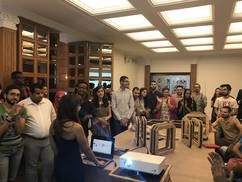
GCED Basic Search Form
Quick Search
You are here
News

“I came from Somalia to attend this training workshop; I work in an NGO that helps students affected by conflict in Somalia to enroll in schools and pursue their education in normal conditions. While attending this training, I am learning a lot about Education for Sustainable Development and the means to teach students about the need to safeguard our planet and guarantee the rights of future generations. As soon as I am back to Somalia, I will advocate with my NGO to introduce education on sustainable development into school curricula”. With these words, Abdallah, a youth activist from Somalia, expressed his joy in participating in the “Education for Sustainable Development Leadership Training” jointly organized by UNESCO and UNESCO Beirut office, in partnership with Organisation de Developpement Durable (ODDD), on 1-3 August 2017 in Beirut.
The “Education for Sustainable Development (ESD) Leadership Training” is a project of the Global Action Programme on ESD. As a follow-up to the UN Decade on ESD (2005-2014), UNESCO launched the Global Action Programme (GAP) on ESD which focuses on generating and scaling up ESD action at all levels, in all areas of education, and in all sustainable development sectors. The GAP has five Action Areas, one of which (GAP 4) is dedicated to mobilizing and engaging youth who are recognized as key to the success of the GAP.
41 out of 450 applicants from the Arab world were selected to participate in the ESD Leadership Training in Beirut. The participants, aged 18 to 35, and coming from 17 Arab countries, are all active leaders in sustainable development in their communities. They work in different fields, including: youth NGOs, Education, Communication, Advertising, Business.
The two-day training programme has a double objective. It aims to empower youth leaders to inspire and mobilize others to take action towards building more sustainable, just and resilient communities; and to build a youth-led ESD network for exchange and collaboration. Mona, a participant from Morocco, noted that: “This training offers us a unique opportunity to connect with youth like us, from different Arab countries, who are active leaders in sustainable development. The synergies created here can help us build a strong network of young Arab activists who will promote sustainable development at different levels”. She added: “I work for Unilever in Casablanca. When I am back to my country, I will seek to implement the notions of sustainable development in my company’s business. For, economic growth is inseparable from sustainable development. Being the Communications officer at Unilever, I will also try to raise awareness of our partners on sustainable development. People need to be aware that they are part of the environment, and therefore any degradation of the environment will directly harm them”.
In the opening ceremony, following an introduction by Salim Shehadeh, Programme Specialist at UNESCO Beirut, the director of UNESCO Beirut Dr Hamed Al Hammami addressed the participants, highlighting UNESCO’s role in promoting ESD. Al Hammami noted that “supporting young men and women is one the main priorities of the UN who seeks to empower youth and build their capacities so that they become agents of positive change in their societies”. He added that “UNESCO in particular seeks to facilitate and support youth participation in the policymaking process, governance, and design and implementation of laws.” Al Hammami noted that “building partnerships with youth is one of the key long-term priorities of UNESCO, as stated in UNESCO Operational Strategy on Youth (2014-2021). In this context, the ESD training offers a platform to connect youth with UNESCO and to build the capacities of the participants so that they play a leading role in promoting ESD in Arab countries”.
Julie Saito, Programme Specialist in the Section of Education for Sustainable Development in UNESCO Paris, stressed that “ESD is a hard and long process as it seeks to promote a balance between human welfare, economic growth and prosperity, local cultural traditions, and scarcity of natural resources, with the aim to guarantee sustainable development and a better life for present and future generations”. “This is why – she added –this ESD Leadership Training is important, as it engages the youth and helps them acquire the skills and tools to promote ESD at the level of their community, country, and region”.
The training programme is based on a participatory and collective learning approach where participants engaged with the theory and practice on the following themes: sustainability, ESD, Systems Thinking, Conflict Transformation, Leadership, Visioning, Communication, Facilitation, Networking, Monitoring and Evaluation. It also included a trip to Taanayel and Shouf regions in Lebanon, where participants visited eco-friendly businesses (Ecolodge), and Water, energy and agriculture infrastructure projects. According to Mohammad, a participant from Yemen, “through the workshops and the field trips we learnt a lot and we acquired new tools on Education for Sustainable Development. This will allow us to be the ambassadors of ESD in our own countries; we now have the tools to implement training sessions and workshops on ESD in our countries to sensitize people on this highly important topic. Yemen is a poor, conflict-ridden country. ESD could be a way to lift people out of poverty and war, and achieve peace, prosperity, and an equal distribution of resources”.
In order to guarantee the sustainability of this initiative, alumni of the ESD Leadership Training will be invited to become part of the ESD Young Leaders Network coordinated by UNESCO.
